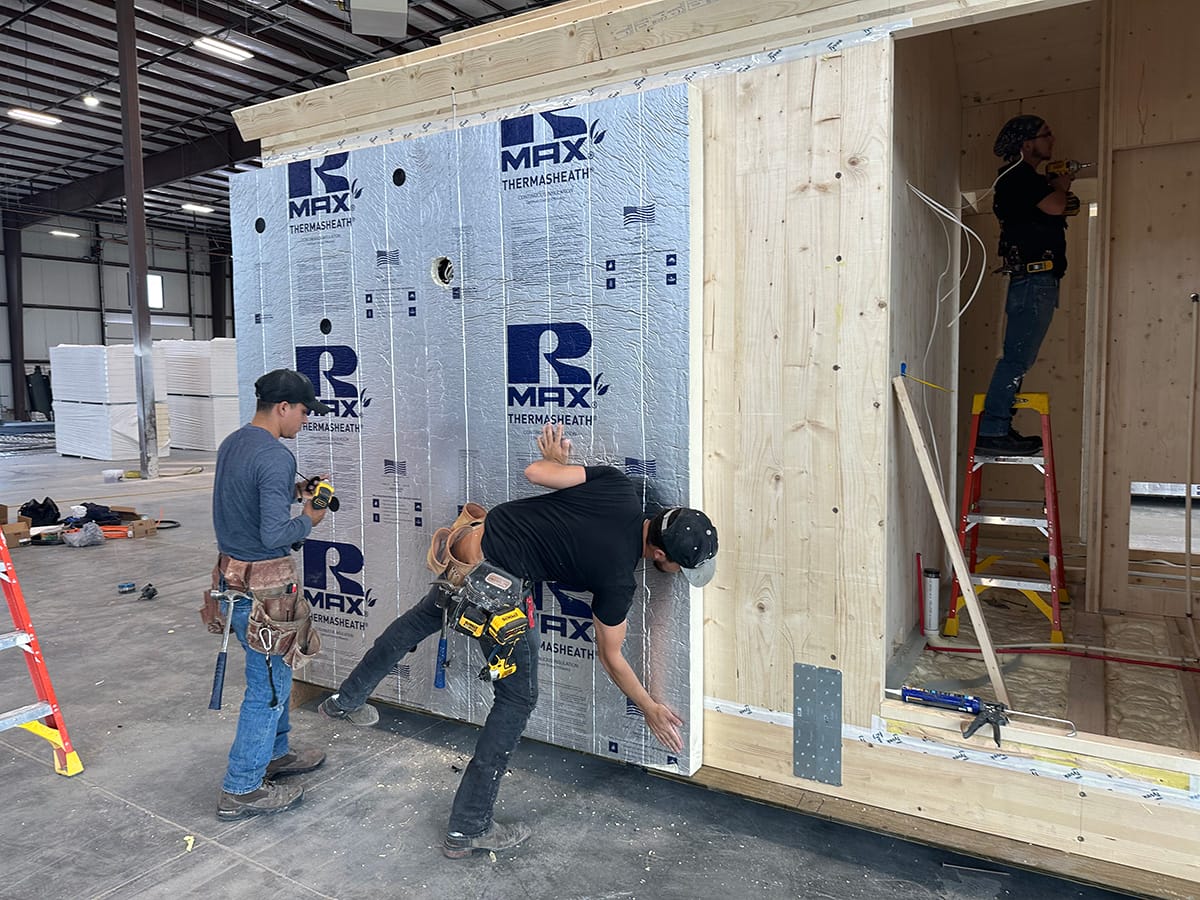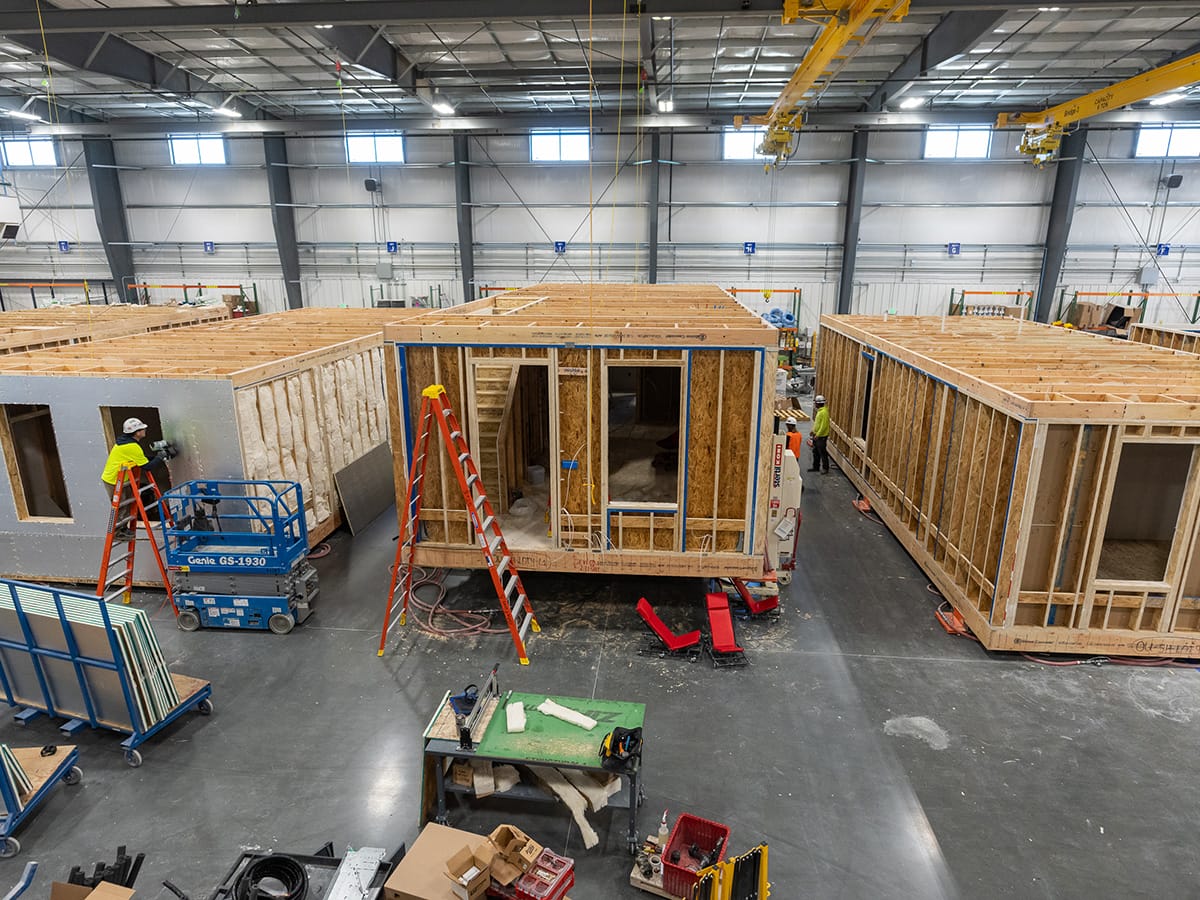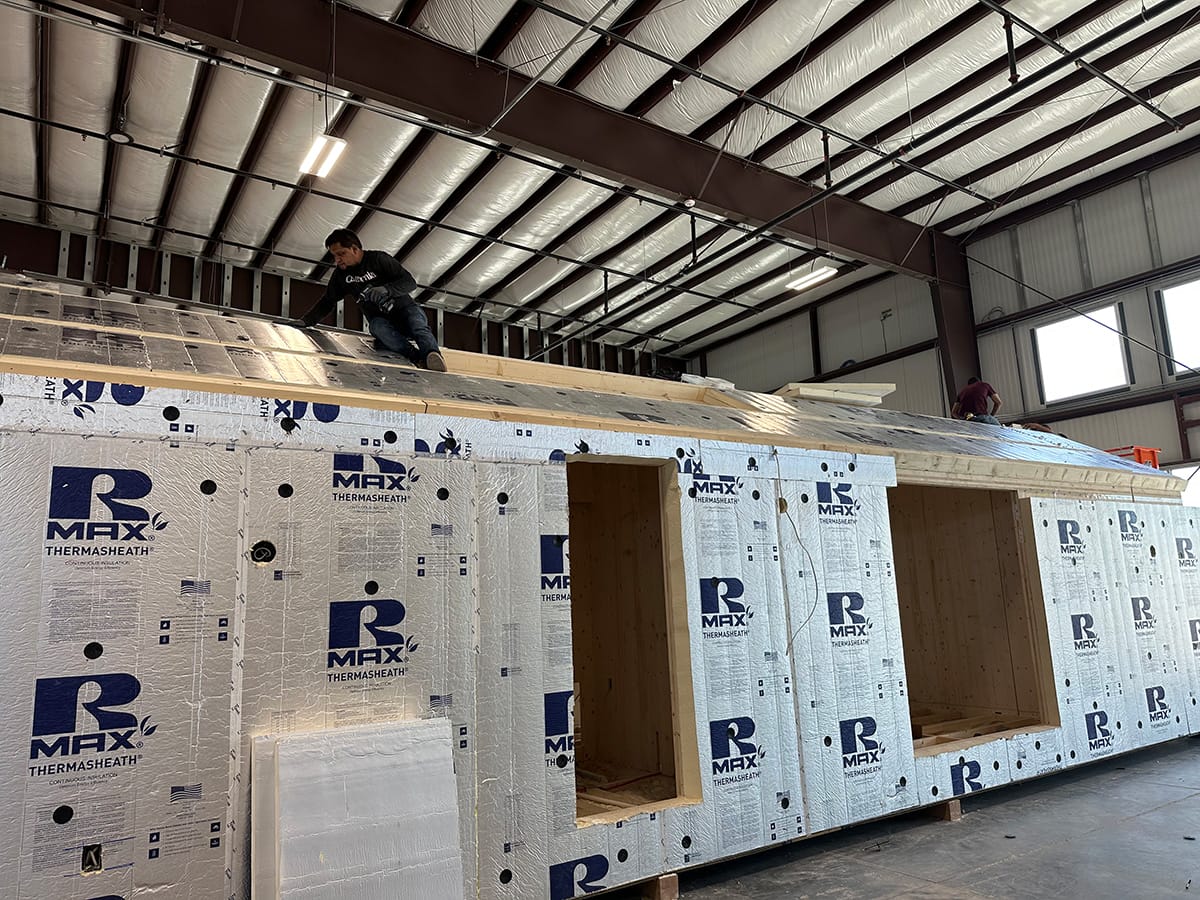A Blanket Approach
Why Polyisocyanurate Could be a Game-Changer for Offsite Construction

Steve Dubin is the Business Development Manager for Rmax, a Sika Company
The world of construction seemed stagnant for a long time. If you compare a black and white photo of a traditional jobsite today to one from the early 1900’s, the only difference you might see is someone holding a cell phone. Many of the materials and methods are very similar, the transportation of those materials is similar, and so are many of the tools.
Lately, though, that lack of significant forward momentum in construction practices is evolving, and offsite or factory-built construction methods have taken center stage. Developers, builders, and future building owners now seek efficiency, sustainability, and cost-effectiveness. Labor rates continue to rise, while the labor pool continues to fall. More stringent building codes add difficulty to the construction process. Housing affordability continues to be a growing challenge as well. Because of these and many other reasons, modular/offsite construction has emerged as a powerful solution to meet those demands. A key element in these prefabricated structures is insulation. In this article, we will explore why installing polyisocyanurate as a continuous insulation in a factory can be a game changer for the construction industry.

4-inch R27.4 polyiso being installed at Stack Homes in Salt Lake City, Utah.
The Rise of Offsite Construction
Since you are reading this article on this particular website, then you already know that offsite construction is a constantly evolving and revolutionary approach to building that involves the assembly of building components, or the entire building itself, in a controlled factory environment. When complete, these components or modules are transported to the construction site and assembled to create the final structure. There are many advantages to this approach: faster construction timelines, reduced on-site labor, minimized waste, and enhanced quality control. But for offsite construction to truly shine, the choice of insulation material is paramount.
Polyisocyanurate Insulation: A Top Performer
Polyisocyanurate, or polyiso, insulation has become a top choice for modular construction. This thermosetting plastic foam board is renowned for its impressive list of attributes:
- High Thermal Performance - Polyiso insulation offers one of the highest R-values per inch among commonly used insulation materials. This is a critical feature for achieving energy-efficient buildings. By using thinner insulation boards, you can maximize the usable space within modular units while maintaining exceptional thermal efficiency. This can help meet the increasingly stringent energy codes across the country without adversely affecting the existing exterior assembly.
- Lightweight - Polyiso insulation is also known for being extremely lightweight. In factory construction, where transport and handling efficiency are essential, its weight- or lack thereof- can lead to cost savings and reduced logistical challenges.
- Fire Resistance - Safety is paramount in construction. Polyiso is a thermoset plastic and boasts excellent fire resistance, which is a must-have feature in modular building components.
- Moisture Resistance - Closed-cell, closed matrix polyiso insulation inherently resists moisture, helping prevent water infiltration and the potential for mold and rot. This is particularly vital in modular structures that may be exposed to moisture during transportation and installation.
- Durability - Polyiso insulation is a strong, dense material that withstands the rigors of construction, ensuring the insulation’s performance throughout the building’s life.
- Sustainability - Many polyiso insulation products contain recycled content and are produced with a low Global Warming Potential (GWP) blowing agent, making it an environmentally friendly choices that align with sustainability goals.
Efficient Factory Installation
One of the most significant advantages of using polyiso insulation in offsite construction is the ease of installation. Its lightweight nature allows for straightforward handling and cutting. Some manufacturers are able to produce their polyiso to exact R-value thicknesses, and exact lengths, reducing wasted time and materials significantly. All of this leads to faster installation times, and enhanced production efficiency, all critical factors in factory-built construction. In many cases, when used as the air and weather resistive layer as well as the insulation, polyiso will help eliminate other layers and processes in the exterior assembly. Case studies have shown elimination of expensive weather resistive structural boards, 3rd party whole house weather resistive wraps, and moisture resistant exterior gypsum, removing significant process time and significant weight from the panel or module.


Installation of structural polyiso insulation at the Fading West factory in Buena Vista, CO.

Stack Homes in Salt Lake City installs polyiso on roof and wall assemblies for a custom-built residence.
Moreover, polyiso insulation is compatible with just about any available claddings and design requirements. Versatility like this allows builders and architects the flexibility to create modular structures that are architecturally appealing while maintaining excellent energy performance.
Future-Ready Insulation
As offsite construction continues to gain momentum, so does the need for innovative, efficient, and high-performing building materials. Polyiso insulation is at the forefront of this movement, providing the thermal performance, fire, air and weather resistance, and durability required for offsite construction. Its lightweight, easy to install, and environmentally friendly, making it an essential tool for modern construction.
When a modular factory is considering the use of polyiso in their assemblies, they should ask themselves some important questions to make an informed decision. For example:
- What are our thermal performance requirements, and how do they corelate to local building codes and regulations?
- Is weight a concern?
- Is moisture resistance important?
- How does polyiso compare to other insulation materials regarding fire, air, and weather resistance?
- Does polyiso integrate well with other building materials we are using?
- Can polyiso reduce our labor and/ or processes by eliminating other components?
- Can polyiso come in specialty lengths or thicknesses suitable to our production needs?
Polyiso insulation is a game changer for the game changing industry that offsite construction is proving to be. By choosing this exceptional insulation material, factories can achieve much higher energy efficiency, much faster construction timelines, and an overall superior quality of construction. In the evolving world of construction, and with its ability to be used in a wide variety of assemblies and applications, polyiso insulation can be a vital component in offsite construction.
About the Author: Steve Dubin, based in Napa, California, is a Business Development Manager for Rmax, a Sika Company. His area of focus is on modular and offsite construction manufacturers. He can be reached on LinkedIn, or directly at dubin.steve@us.sika.com.
More from Modular Advantage
AoRa Development Aims for New York’s First Triple Net Zero Building Using Modular Methods
More cities are providing funding for newer infrastructure projects as long as they meet sustainability requirements. This is how modular can fit the bill, thanks to its lower waste production.
Developers and Designers: Lessons Learned with Modular Design
Modular construction is attractive to many developers because sitework and module construction can occur simultaneously, shortening the schedule and reducing additional costs.
UTILE: Putting Modular Building on a Fast Track
In Quebec, UTILE is taking the lead in creating affordable modular buildings to help decrease the student housing shortage. During the process, the company discovered what it takes to make the transition to modular building a success.
Sobha Modular Teaches Developers How to Think Like Manufacturers
With its 2.7 million square foot factory in UAE, Sobha Modular is bringing both its high-end bathroom pods to high-end residences to Dubai while developing modular projects for the U.S. and Australia.
RoadMasters: Why Early Transport Planning is Make-or-Break in Modular Construction
In modular construction, transportation is often called the “missing link.” While it rarely stops a project outright, poor planning can trigger costly delays, rerouting, and budget overruns.
Navigating Risk in Commercial Real Estate and Modular Construction: Insights from a 44-Year Industry Veteran
Modular projects involve manufacturing, transportation, and on-site assembly. Developers must understand exactly what they are responsible for versus what they subcontract. Risk advisors should research the developer’s contractors, subcontractors, and design-build consultants—especially the modular manufacturer.
Art²Park – A Creative Application of Modular and Conventional Construction
Art²Park is more than a park building—it’s a demonstration of what modular construction can achieve when thoughtfully integrated with traditional materials. The use of shipping containers provided not only speed and sustainability benefits but also a powerful structural core that simplified and strengthened the rest of the building.
Building Smarter: A New Standard in Modular Construction Efficiency
Rising material prices, labour shortages, expensive financing and tightening environmental rules have made conventional construction slower, costlier, and more unpredictable. To keep projects on schedule and within budget, builders are increasingly turning to smarter industrialized methods.
Resia: Breaking All the Rules
Resia Manufacturing, a division of U.S.-based Resia, is now offering prefabricated bathroom and kitchen components to industry partners. Its hybrid fabrication facility produces more precise bathroom and kitchen components (modules) faster and at lower cost than traditional construction. Here’s how Resia Manufacturing does it.
How LINQ Modular Innovates to Bring Modular To The Market in the UAE and Beyond
LINQ Modular, with an office and three manufacturing facilities in Dubai, is a modular firm based in United Arab Emirates. The company is on a mission: to break open the housing and construction markets in the Gulf Cooperation Council (GCC) area with modular.










